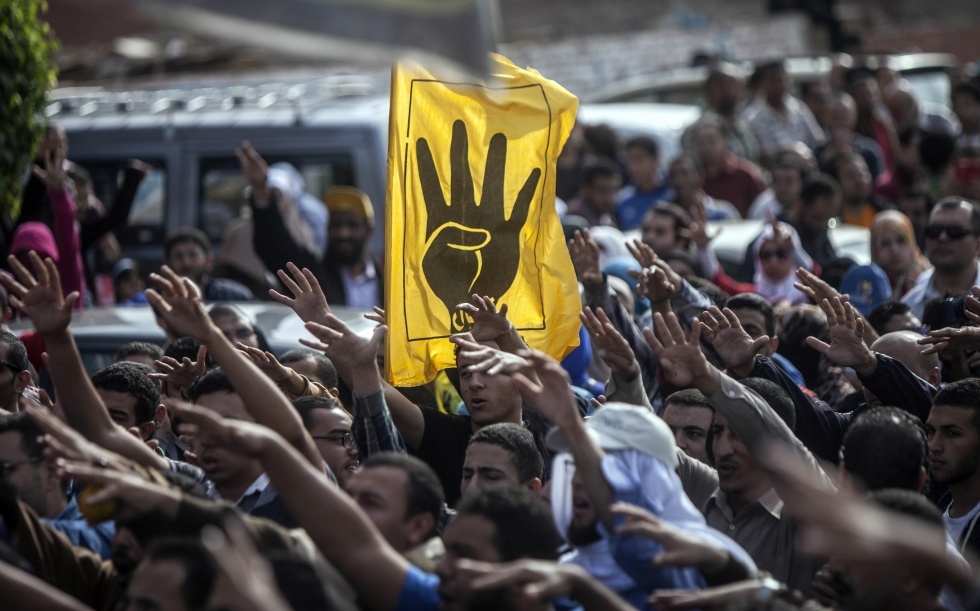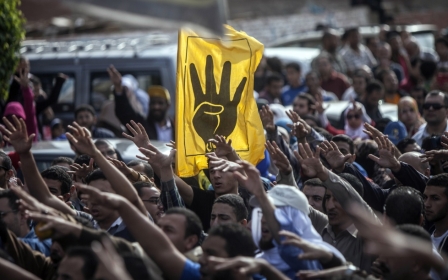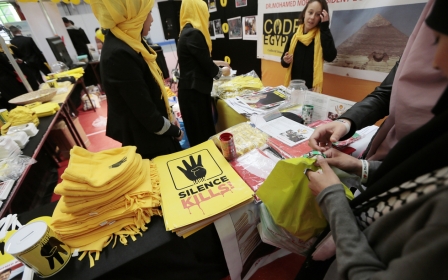UK minister rejects Muslim Brotherhood inquiry was 'clumsy'

The appointment of Britain's ambassador to Saudi Arabia to lead an inquiry into the Muslim Brotherhood was the right choice and did not produce bias against the group, the Middle East minister told a committee of MPs.
Speaking before the foreign affairs select committee on Wednesday, Tobias Ellwood said Sir John Jenkins was an "exemplar of professionalism" and rejected statements that his appointment was "clumsy" and may have led members of the Brotherhood to believe the inquiry was a "set-up job" conducted at the behest of Riyadh.
The British government's report, released two years ago, concluded that the Brotherhood should not be proscribed as a violent organisation, but that some members had moved on into "extremism".
The report formed part of the government's review of counter-extremism policy, but was beset by claims at the time it was conducted under pressure from Riyadh, which has outlawed the group.
It was also criticised on publication for "overplaying" the organisation's links to violence.
In questions to Ellwood, the committee's chairman, Crispin Blunt, said Jenkins' appointment could have been seen as "pretty clumsy".
"If you are on the receiving end... if it is clear that it is the British ambassador to Saudi Arabia that is going to conduct this inquiry, do you think there is going to be a chance of being perceived as a fair piece of work before it's even begun? It was not a very clever appointment, surely?"
Ellwood disagreed, saying: "The appointment was an astute one, and I stand by that."
He said Jenkins was "widely respected" and that it was an "honourable report written by an honourable man".
"Any ambassador in any post are exemplars of professionalism and they are committed to working for Her Majesty's government.
"In the same way, Her Majesty's government might change from Labour to Conservative, their commitment to the cause will be unchanged.
"Simply because you have an ambassador that is working in Saudi Arabia, to somehow suggest the report might be biased is disingenuous.
"I would like to confirm that in all cases our ambassadors work diligently across the world without prejudice, without compassion towards the country they are working in."
Ellwood said the Jenkins report had helped the government formulate its counter-extremism policy - which includes the controversial Prevent programme that has been extended across the public sector and has been beset by examples of inappropriate use.
Blunt repeatedly asked if the new government under Prime Minister Theresa May might reverse its position on the Brotherhood. Ellwood replied that while the situation had advanced in the two years since the Jenkins report's publication, he "stood by" its contents.
'Political Islam' a catch-all
The committee also discussed the government's attitude and policy regarding "political Islam," with members questioning how such a term could be applied to a disparate number of groups, from moderates in Tunisia such as Enhaddha, to militant organisations including the Islamic State group.
Responding, Ellwood said that the term was indeed a "catch-all," but government policy was distinct when dealing with specific situations in the Middle East, and that political Islam was "part and parcel" of British engagement with countries in the region.
Ellwood added that many political Islamist groups could be encouraged to develop democracy in the Middle East, such as Enhaddha, and warned that "locking out" movements had the potential to move their actions towards "extremism".
"Since the Arab Spring, which was a line in the sand, there has been mixed fortunes for Islamic parties. In some cases there have been movements in positive ways and in some cases not," he said.
He gave the example of Iraq, where the Shia-dominated government of Nouri al-Maliki had sidelined Sunnis, leading to a violent reaction and a move to extremist activity.
"They tried to be involved in democratic involvement... but they were turned away from involvement and therefore use violence as a means of power," he said.
"What happened in Fallujah is the best example of that, where the Sunnis were denied any space to participate in Baghdad politics, and resorted in extremis into solidifying an advance of al-Qaeda. We are all aware of the consequences."
He said that Britain had a "unique relationship" with the region that could be leveraged to effect change.
"Our aim is to support our primary objectives of protecting our security and promoting our prosperity, and protecting our values through an understanding for what happens in each country... We have to approach each on its own merits."
"In many cases, we do have a unique relationship with these countries. We are trusted, we are seen as more transparent and committed to understanding what is happening and working with them. That is something we need to leverage.
"We should also recognise that there has been a growth in sectarianism that has compounded the challenges that we face today. There is still much to do in encouraging human rights, the rights of women, rights of minorities."
Ellwood said while Britain should encourage democratic development in the Middle East, interference by the international community could have negative consequences. Nevertheless, "there is a supportive role to play to encourage that in the right direction".
New MEE newsletter: Jerusalem Dispatch
Sign up to get the latest insights and analysis on Israel-Palestine, alongside Turkey Unpacked and other MEE newsletters
Middle East Eye delivers independent and unrivalled coverage and analysis of the Middle East, North Africa and beyond. To learn more about republishing this content and the associated fees, please fill out this form. More about MEE can be found here.




